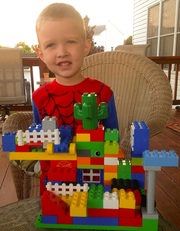
Gifted kids seem to learn by osmosis. Parents don't have to teach them to read, count backward, or spell. They just kind of - - figure it out. For parents, it can be amazing and scary and overwhelming all at once. People - teachers, peers, the grocery store clerk - start to notice and comment: "Wow. She's so smart!"
This refrain becomes common for bright kids. Things come easily to them. And that must mean they're smart. "I am smart. Things are easy. I am smart. Things are easy," over and over in their little heads.
Then, something happens. It might be long division. Chemistry is a big one, too. Some kids make it to college before they hit their "wall." But when they do, it isn't pretty. All of a sudden, things aren't easy... and if things aren't easy, does that mean they aren't smart?
When Carol Dweck's book Mindset: The New Psychology of Success started gaining traction, I grabbed it and shouted from the rooftops, saying "YES! This is what gifted kids need! The fixed mindset is causing all kinds of problems! If we can foster a growth mindset in our kids, they'll be able to persevere and have grit and develop resilience and (insert buzzword here)."
But then, something else began to happen. People picked up on something that Dweck mentions often in her book. That intelligence is malleable. That people can grow their intelligence.
And then, all of a sudden, all children were gifted.
And if all children are gifted, no children are gifted.
If all children can grow their intelligence, should they all be receiving gifted education services? Or, maybe nobody should...?
Research shows that cognitive ability is relatively stable throughout a lifetime. I've been involved in gifted education long enough to know that there is some fluctuation in IQ scores for a variety of reasons. But to say that a neurotypical child with an average IQ of 100 can raise his intelligence two or three standard deviations (to an IQ of 130 or 145) simply by challenging himself is both unrealistic for the neurotypical child and damaging for the cognitively advanced child. This interpretation of Dweck's work perpetuates the notion that gifted education services are elitist and minimizes the fact that the development of the gifted child is inherently different than that of other children.
Brain scans show that gifted children have distinct neurological differences in the way their brains operate. Genetics also play an important part of intelligence. Social and environmental factors play a piece in helping children reach their potential, but much of that original ability is innate. (I'll address the social justice issues facing gifted education in another post at another time.)
Effective praise is important, but it isn't going to send your kid to MIT. Encouraging kids to pursue challenge is going to help them be successful but it won't make them gifted.
I believe more accurate phrasing Dweck could have used would be related to improving "achievement" or "ability," instead of "intelligence." You can grow your ability in certain areas - mathematics, spelling, basketball, or painting - by challenging yourself. Educators can facilitate this by ensuring that children are given specific feedback on their efforts to help guide their progress and that instruction takes place in the zone of proximal development.
But let's not fool ourselves into thinking every child is the same. Gifted students need gifted education services for the very reason Dweck posits in her work: When children aren't challenged, their brains don't grow. And, for some students, placement in the general education classroom just isn't enough to foster a challenging learning environment.
Gifted learners deserve the chance to develop a growth mindset, too, and the gifted education classroom is the best place for this to happen.

